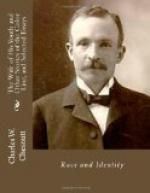The sheriff reentered the house, and put on his coat and hat. He then took down a double-barreled shotgun and loaded it with buckshot. Filling the chambers of a revolver with fresh cartridges, he slipped it into the pocket of the sack-coat which he wore.
A comely young woman in a calico dress watched these proceedings with anxious surprise.
“Where are you going, father?” she asked. She had not heard the conversation with the negro.
“I am goin’ over to the jail,” responded the sheriff. “There ’s a mob comin’ this way to lynch the nigger we ’ve got locked up. But they won’t do it,” he added, with emphasis.
“Oh, father! don’t go!” pleaded the girl, clinging to his arm; “they ’ll shoot you if you don’t give him up.”
“You never mind me, Polly,” said her father reassuringly, as he gently unclasped her hands from his arm. “I ’ll take care of myself and the prisoner, too. There ain’t a man in Branson County that would shoot me. Besides, I have faced fire too often to be scared away from my duty. You keep close in the house,” he continued, “and if any one disturbs you just use the old horse-pistol in the top bureau drawer. It ’s a little old-fashioned, but it did good work a few years ago.”
The young girl shuddered at this sanguinary allusion, but made no further objection to her father’s departure.
The sheriff of Branson was a man far above the average of the community in wealth, education, and social position. His had been one of the few families in the county that before the war had owned large estates and numerous slaves. He had graduated at the State University at Chapel Hill, and had kept up some acquaintance with current literature and advanced thought. He had traveled some in his youth, and was looked up to in the county as an authority on all subjects connected with the outer world. At first an ardent supporter of the Union, he had opposed the secession movement in his native State as long as opposition availed to stem the tide of public opinion. Yielding at last to the force of circumstances, he had entered the Confederate service rather late in the war, and served with distinction through several campaigns, rising in time to the rank of colonel. After the war he had taken the oath of allegiance, and had been chosen by the people as the most available candidate for the office of sheriff, to which he had been elected without opposition. He had filled the office for several terms, and was universally popular with his constituents.
Colonel or Sheriff Campbell, as he was indifferently called, as the military or civil title happened to be most important in the opinion of the person addressing him, had a high sense of the responsibility attaching to his office. He had sworn to do his duty faithfully, and he knew what his duty was, as sheriff, perhaps more clearly than he had apprehended it in other passages of his life. It was, therefore, with no uncertainty in regard to his course that he prepared his weapons and went over to the jail. He had no fears for Polly’s safety.




